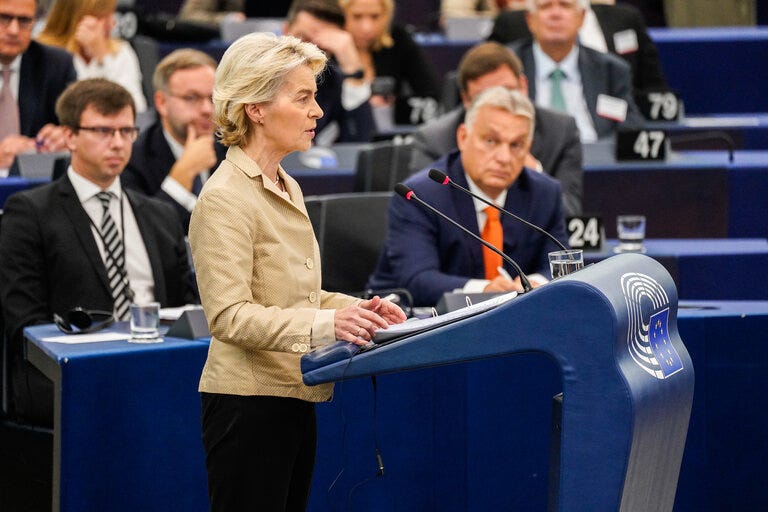Has the EU president grown a spine?
Ursula von der Leyen's barn burner speech against Viktor Orban in the European Parliament yesterday could herald a dramatic shift away from the deference she showed national leaders in her first term.
Back in April, while Ursula von der Leyen’s reappointment as President of the European Commission was still uncertain, I wrote that the EU needs a bully as a president. While it might sound like an unattractive quality in a leader, the point was that only a strong figure at the top could move the union past the inertia that is leading to irrelevance on the world stage. It was a reference to the “bully pulpit” people refer to with the US presidency. Only someone willing to take on the entrenched power of national capitals, getting power flowing down to the local level and up to the federal level, would be able to get the EU to a place of strength where it can be both economically and militarily secure, and independent of the United States and China. And the EU has not seen a president like that since Jacques Delors 30 years ago.
In April I wrote that someone like Thierry Breton would be that kind of leader. But I also noted that his ambitions to become Commission President were a pipe dream. The central problem is that the president is selected by national leaders rather than by a vote of EU citizens. And those national leaders will always select someone who doesn’t threaten their own entrenched power, rather than someone who is the best for the union as a whole. Sure enough, Emmanuel Macron seemed only too happy to dump Breton when von der Leyen pulled her power move last month and told the French president she couldn’t work with him. While Breton had always faithfully toed the Macroniste line in the Berlaymont, his strength had grown so much as to look threatening to an increasingly weak French president who was not willing to expend political capital fighting von der Leyen on this.
Ursula von der Leyen, I wrote at the time, is not the bully that the EU needs. But she is exactly the type of person that national leaders want. She did not challenge them during her first term. She showed particular fawning deference to Germany, her home country, and to France, whose president put her in power. But watching her speak so forcefully, staring straight into the eyes of Viktor Oraban during the debate with him in the European Parliament yesterday, I started to think – is this a whole new VDL? She lambasted the Hungarian strongman for his refusal to support Ukraine, his friendship with Putin, his hypocrisy on migration and sovereignty, his repression of dissent at home and his rejection of climate action. The blunt criticism by a Commission President of a sitting national leader, directly to his face, is unprecedented in the history of the European Union. In my 14 years in Brussels, I’ve never seen anything like it. My jaw was on the floor. Now that she’s secured reappointment and is no longer dependent on national governments to stay in power, is von der Leyen ready to be the strong leader Europe needs? Could VDL become a new Delors in her second term? As much as I’d like to think so, there is just as much evidence that yesterday’s performance was an aberration – something she could only do because the rest of the national governments gave her the space to do it.




